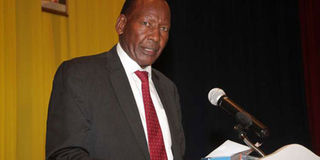Commencement of law on NGOs overdue

Joseph ole Nkaissery, the Cabinet Secretary for Interior and Coordination of National Government, at Safari Park Hotel and Casino in Nairobi on December 15, 2016. PHOTO | ANTHONY OMUYA | NATION MEDIA GROUP
What you need to know:
The High Court has confirmed that the CS cannot stand in the way of a law that has been passed by the legislature and assented to by the president just because he does not like what it provides.
- The law is the law, whether we like it or not.
Interior Cabinet Secretary Joseph Nkaissery should commence the law immediately.
On November 4, the High Court ordered Cabinet Secretary Mwangi Kiunjuri to commence the Public Benefits Organizations Act, 2013. The law, which was a product of wide stakeholder consultation and negotiation, was passed by the last Parliament and was assented to by then president Mwai Kibaki. It was meant to streamline activities of non-governmental organisations (NGOs), create a framework for self-regulation, and ensure accountability by organisations that work for the public’s benefit.
In a strange twist, just as the court order was being delivered, it emerged that the government had moved the NGO Coordination Board from the Ministry of Devolution and Planning to Interior and Coordination of National Government.
Was this an attempt to defeat a court process? Does the court order still have the force of law? Is coordination of civil society a national security issue?
The courts have been instrumental in the protection of civic space, especially NGOs, in Kenya. In the past two years, courts have stepped in to reverse attempted deregistration of NGOs that work on issues related to good governance, human rights, and accountability such as Haki Africa, Muhuri, and Kenya Human Rights Commission.
Since 2013, the Jubilee administration seems hell-bent on ensuring that the Public Benefits Organisation Act is not commenced in its current form by attempting to amend it to include retrogressive and oppressive laws, strategies that are heavily borrowed from countries such as Russia and Ethiopia, where free speech, freedom of association, and civic space is virtually nonexistent. This is in stark contrast to the Constitution, which espouses inclusiveness, transparency, democracy, freedom, accountability, the rule of law, and respect for human rights.
CRITICAL VOICE
Historically, Kenyan civil society groups, often called NGOs, have been integral to securing respect for the rule of law, transparency, accountability, and human rights and remain a critical voice in defending the rights of all Kenyans.
However, despite efforts by civil society to fast-track the commencement of the Act, successive Cabinet secretaries in charge of Devolution and Planning in the Jubilee government have refused or failed to operationalise the law.
It is noteworthy that the Jubilee manifesto pledged to introduce a Charities Act to, among other things, regulate political campaigning by NGOs to ensure that they only campaign on issues that promote their core mandate and do not engage in party politics. However, experts and stakeholders all agree that the Act as it stands is more than sufficient because it obligates civil society organisations to stick to their objectives and to be financially accountable.
Experts opine that the Act advances and demands good leadership and accountability from the organisations and the regulator, in line with the spirit of Chapter 6 of the Constitution, provides for an institutional framework for principled partnership between the government and public benefit organisations, allows the groups to determine standards, certification, and adherence to a professional code of conduct, and, most importantly, brings all types of civil society organisations under one legal regime.
ALARMING RATE
Efforts by several governments to restrict the space in which civil society operates have grown at an alarming rate. Increasingly, governments are using laws, policies, and practices to limit the ability of people to come together to improve their lives NGOs.
Interestingly, under the Jubilee coalition, civil society has been dubbed “evil society” and maligned as agents of foreign masters and even active agents of terrorism. However, the courts have found that there is no justification for these assertions.
These organisations continue to play a vital role in representing the marginalised, providing health care and emergency assistance, especially in far-flung areas and slums, facilitate access to justice, advocating social justice and pressing for transparency and accountability by duty holders.
The High Court has confirmed that the CS cannot stand in the way of a law that has been passed by the legislature and assented to by the president just because he does not like what it provides. The law is the law, whether we like it or not and it is wrong to deny Kenyans and the sector a law that was the product of wide stakeholder consultation. Interior Cabinet Secretary Joseph Nkaissery should commence the law immediately.
Demas Kiprono is advocate, High Court and senior programmes officer, at Article 19 Eastern Africa.





